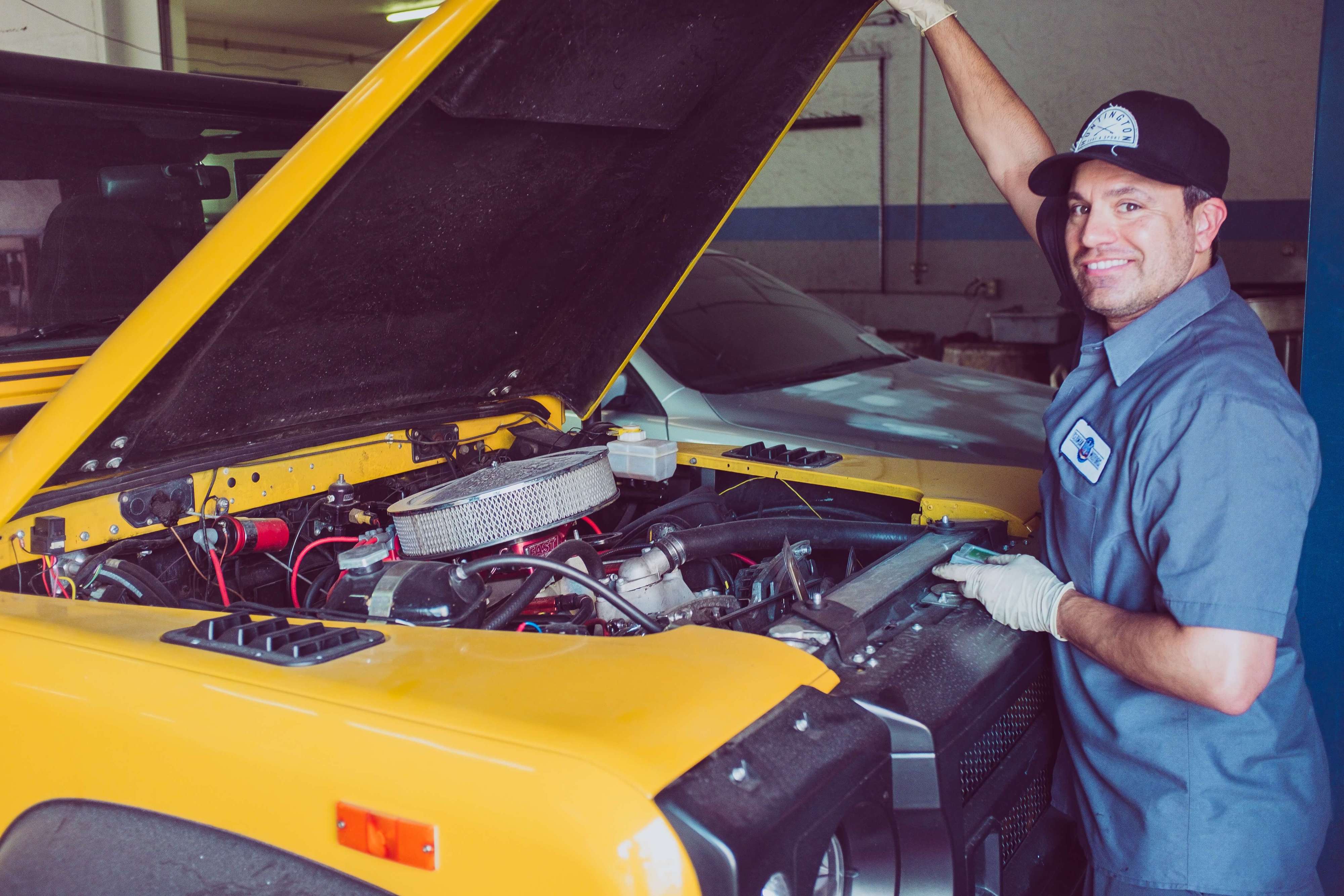How Much do Mechanics Make?
Depending on where you live and work, auto mechanic salaries can vary. Here we address the question, how much do mechanics make?When headed out of high school or transitioning careers, potential salary is an important thing to consider. The automotive repair industry can provide a lucrative career, but the salaries can vary because of several different factors.
Here we will look at a variety of aspects to answer the question, “How much do mechanics make?” Everything from the state you live in, the specific industry you work in, and any specializations you may have will impact your mechanic salary. All of the statistics used have been retrieved directly from the Bureau of Labor Statistics.
Mechanic Salaries by State
Mechanic pay can vary all across the country. Here you can compare how much mechanics make in different states. Already know what state you want to go to school in? Check out all mechanic schools here.
Alabama | Alaska | Arizona | Arkansas | California | Colorado | Connecticut | Delaware | Florida | Georgia | Hawaii | Idaho | Illinois | Indiana | Iowa | Kansas | Kentucky | Louisiana | Maine | Maryland | Massachusetts | Michigan | Minnesota | Mississippi | Missouri | Montana | Nebraska | Nevada | New Hampshire | New Jersey | New Mexico | New York | North Carolina | North Dakota | Ohio | Oklahoma | Oregon | Pennsylvania | Rhode Island | South Carolina | South Dakota | Tennessee | Texas | Utah | Vermont | Virginia | Washington | West Virginia | Wisconsin | Wyoming
Alabama
Lowest 10% – $22,070Average – $38,890
Highest 10% – $62,880
Total Employed – 8,170
Alaska
Lowest 10% – $28,840Average – $55,420
Highest 10% – $83,040
Total Employed – 1,740
Arizona
Lowest 10% – $23,400Average – $41,370
Highest 10% – $65,630
Total Employed – 13,850
Arkansas
Lowest 10% – $22,230Average – $35,190
Highest 10% – $59,130
Total Employed – 5,670
California
Lowest 10% – $26,700Average – $45,840
Highest 10% – $75,460
Total Employed – 65,210
Colorado
Lowest 10% – $25,160Average – $46,220
Highest 10% – $73,130
Total Employed – 11,730
Connecticut
Lowest 10% – $27,540Average – $48,440
Highest 10% – $74,990
Total Employed – 8,330
Delaware
Lowest 10% – $24,500Average – $42,470
Highest 10% – $65,220
Total Employed – 1,850
Florida
Lowest 10% – $21,790Average – $36,710
Highest 10% – $62,600
Total Employed – 45,770
Georgia
Lowest 10% – $21,860Average – $40,150
Highest 10% – $64,800
Total Employed – 20,420
Hawaii
Lowest 10% – $25,080Average – $45,650
Highest 10% – $65,350
Total Employed – 2,580
Idaho
Lowest 10% – $24,480Average – $39,540
Highest 10% – $60,890
Total Employed – 4,000
Illinois
Lowest 10% – $22,840Average – $42,970
Highest 10% – $77,150
Total Employed – 27,250
Indiana
Lowest 10% – $23,810Average – $37,730
Highest 10% – $62,480
Total Employed – 15,190
Iowa
Lowest 10% – $23,580Average – $40,190
Highest 10% – $63,320
Total Employed – 7,650
Kansas
Lowest 10% – $23,190Average – $38,090
Highest 10% – $61,390
Total Employed – 6,560
Kentucky
Lowest 10% – $20,700Average – $34,900
Highest 10% – $60,950
Total Employed – 8,350
Louisiana
Lowest 10% – $20,310Average – $37,400
Highest 10% – $62,360
Total Employed – 7,820
Maine
Lowest 10% – $25,030Average – $36,690
Highest 10% – $57,670
Total Employed – 4,050
Maryland
Lowest 10% – $26,240Average – $48,130
Highest 10% – $76,460
Total Employed – 12,030
Massachusetts
Lowest 10% – $25,780Average – $43,200
Highest 10% – $67,080
Total Employed – 14,970
Michigan
Lowest 10% – $21,540Average – $38,630
Highest 10% – $64,540
Total Employed – 19,360
Minnesota
Lowest 10% – $24,700Average – $40,350
Highest 10% – $62,160
Total Employed – 11,950
Mississippi
Lowest 10% – $19,790Average – $35,000
Highest 10% – $62,100
Total Employed – 5,460
Missouri
Lowest 10% – $23,180Average – $42,050
Highest 10% – $63,070
Total Employed – 16,530
Montana
Lowest 10% – $21,420Average – $37,370
Highest 10% – $61,500
Total Employed – 2,920
Nebraska
Lowest 10% – $22,630Average – $41,430
Highest 10% – $63,730
Total Employed – 4,830
Nevada
Lowest 10% – $26,260Average – $43,570
Highest 10% – $70,260
Total Employed – 5,200
New Hampshire
Lowest 10% – $26,950Average – $43,060
Highest 10% – $65,830
Total Employed – 3,540
New Jersey
Lowest 10% – $23,250Average – $48.790
Highest 10% – $75,500
Total Employed – 14,810
New Mexico
Lowest 10% – $19,830Average – $35,820
Highest 10% – $64,140
Total Employed – 4,390
New York
Lowest 10% – $23,950Average – $39,990
Highest 10% – $71,140
Total Employed – 34,370
North Carolina
Lowest 10% – $21,270Average – $39,390
Highest 10% – $63,250
Total Employed – 22,610
North Dakota
Lowest 10% – $26,260Average – $42,710
Highest 10% – $66,060
Total Employed – 2,330
Ohio
Lowest 10% – $21,380Average – $37,630
Highest 10% – $62,710
Total Employed – 23,220
Oklahoma
Lowest 10% – $21,220Average – $37,710
Highest 10% – $63,390
Total Employed – 7,300
Oregon
Lowest 10% – $26,590Average – $43,530
Highest 10% – $67,310
Total Employed – 6,840
Pennsylvania
Lowest 10% – $22,140Average – $38,930
Highest 10% – $61,330
Total Employed – 30,390
Rhode Island
Lowest 10% – $23,880Average – $37,610
Highest 10% – $61,300
Total Employed – 2,430
South Carolina
Lowest 10% – $21,630Average – $37,750
Highest 10% – $61,460
Total Employed – 10,620
South Dakota
Lowest 10% – $26,930Average – $39,720
Highest 10% – $59,680
Total Employed – 2,000
Tennessee
Lowest 10% – $22,120Average – $37,520
Highest 10% – $62,010
Total Employed – 14,800
Texas
Lowest 10% – $23,350Average – $40,570
Highest 10% – $68,730
Total Employed – 50,500
Utah
Lowest 10% – $21,730Average – $39,880
Highest 10% – $69,860
Total Employed – 6,460
Vermont
Lowest 10% – $28,270Average – $39,890
Highest 10% – $56,440
Total Employed – 1,670
Virginia
Lowest 10% – $23,770Average – $45,640
Highest 10% – $75,280
Total Employed – 19,650
Washington
Lowest 10% – $29,330Average – $47,590
Highest 10% – $73,800
Total Employed – 13,420
West Virginia
Lowest 10% – $20,620Average – $31,590
Highest 10% – $54,620
Total Employed – 3,800
Wisconsin
Lowest 10% – $25,410Average – $38,450
Highest 10% – $60,780
Total Employed – 11,650
Wyoming
Lowest 10% – $27,020Average – $45,240
Highest 10% – $67,900
Total Employed – 1,420
Auto Mechanic Salaries by Industry
Although a majority of mechanics find themselves working in the automotive repair industry, this is not the only industry to work in. Many different industries require automotive maintenance giving mechanics a wide variety of workplaces to choose from.
You will see that the most popular industry is the general automotive repair industry. This consists of the typical workplaces for mechanics like auto shops. Many mechanics begin their career in the auto repair industry before moving on to continue wrenching elsewhere. As a result of the high population of mechanics in this industry, the salaries can vary all across the board. In all, the automotive repair and maintenance industry is a great place to gain experience. So, how much do mechanics make in this industry? Read on to find out.
Perhaps the most glamorous of these industries is also the highest paid, the spectator sports industry. Mechanic salaries in the spectator sports world can range anywhere around $65,000. This includes mechanics for major sporting leagues like NASCAR and others. Of course, all of this depends on the team and the league. Some mechanics may make more and some may make less, but if you desire to work in sports, this is a great yet competitive industry.
These are some of the best industries to work in for auto mechanics.
Automotive Repair and Maintenance
- Employment: 100,910
- Average Hourly Wage: $22.31
Postal Service (Federal Government)
- Employment: 190
- Average Hourly Wage: $30.56
Local Government (OES Designation)
- Employment: 800
- Average Hourly Wage: $28.41
Other Motor Vehicle Dealers
- Employment: 570
- Average Hourly Wage: $21.20
Employment Services
- Employment: 930
- Average Hourly Wage: $18.13
Spectator Sports
- Employment: 27,040
- Average Hourly Wage: $30.57
Federal Executive Branch
- Employment: 150
- Average Hourly Wage: $29.21
Automotive Parts, Accessories, and Tire Stores
- Employment: 1,860
- Average Hourly Wage: $20.73
Motor Vehicle and Parts and Suppliers Merchant Wholesalers
- Employment: 3,280
- Average Hourly Wage: $21.66
Automobile Dealers
- Employment: 27,040
- Average Hourly Wage: $22.23
Specialty Mechanic Salaries
Lastly, let’s take a look at the potential salary if you decide to specialize as a mechanic. Specializing can create more of a demand around your work which can produce higher paychecks. There are many different ways you can specialize from becoming a manager or specializing on a specific repair or manufacturer. Below are some of the more popular specializations and how much they make.
| Specialization | Total Employed | Average Hourly Wage | Average Annual Salary |
| Aircraft Mechanics and Service Technicians | 131,690 | $31.36 | $65,230 |
| Rail Car Repairers | 24,720 | $26.93 | $56,020 |
| Mobile Heavy Equipment Mechanics (Not Engines) | 140,260 | $25.66 | $53,370 |
| Diesel Vehicle and Engine Specialists | 264,860 | $23.63 | $49,150 |
| Automotive Body and Related Repairers | 142,060 | $22.34 | $46,460 |
| Motorboat Mechanics and Service Technicians | 22,280 | $20.35 | $42,330 |
| Farm Equipment Mechanics | 34,300 | $20.29 | $42,190 |
| Recreational Vehicle Service Technicians | 15,560 | $19.28 | $40,090 |
| Motorcycle Mechanics | 15,090 | $18.87 | $39,260 |
| Outdoor Power Equipment and Other Small Engines | 31,760 | $17.76 | $36,940 |
| Automotive Glass Installers and Repairers | 19,640 | $17.49 | $36,370 |
| Tire Repairers and Changers | 111,620 | $14.20 | $29,530 |
Mechanic Salaries FAQ
How much do mechanics make?
According to the Bureau of Labor Statistics, the average hourly wage for auto mechanics is $21.02 with an average annual salary of $43,730.
How much do mechanics make at a dealership?
One of the largest industries that mechanics work in are auto dealerships. Here, mechanics can expect to earn an hourly wage of about $22.23 and an average annual salary of $46,240.
How much does a master technician make?
Although the Bureau of Labor Statistics does not report exactly on how much a master technician makes, the top 10% of auto mechanics make around $65,000. Therefore, it is safe to assume that master technicians make around $65,000.
How much does a certified mechanic make?
Certified mechanics make up a large portion of auto mechanics in the United States. They will make around the average salary for the industry which is $21.02 per hour and $43,730 per year. Starting out, mechanics will make less until they gain their certifications and earn pay-raises to get up to the average. From there, the more experience and certifications you have, the more you will get paid.
How much do NASCAR mechanics make?
Although this will vary greatly, the Bureau of Labor Statistics has reported that mechanics who work in spectator sports earn an average hourly wage of $30.57 and an average annual salary of $63,580.
Explore More Resources for Mechanics
How to Get ASE Certified
Are you wondering how to get ASE certified? This is a large topic with lots of information that can be confusing. We have broken it down into 5 simple steps so you can become ASE certified.
Best Automotive Schools in the Northeast
Home of the great New York City, the Northeast is a hotbed for cars. Mechanics need training so here are the best automotive schools in the Northeast.
Best Automotive Schools in the Southeast
Mechanic schools all across the nation are trying to get your attention. We break through the noise with the 5 best automotive schools in the Southeast!



